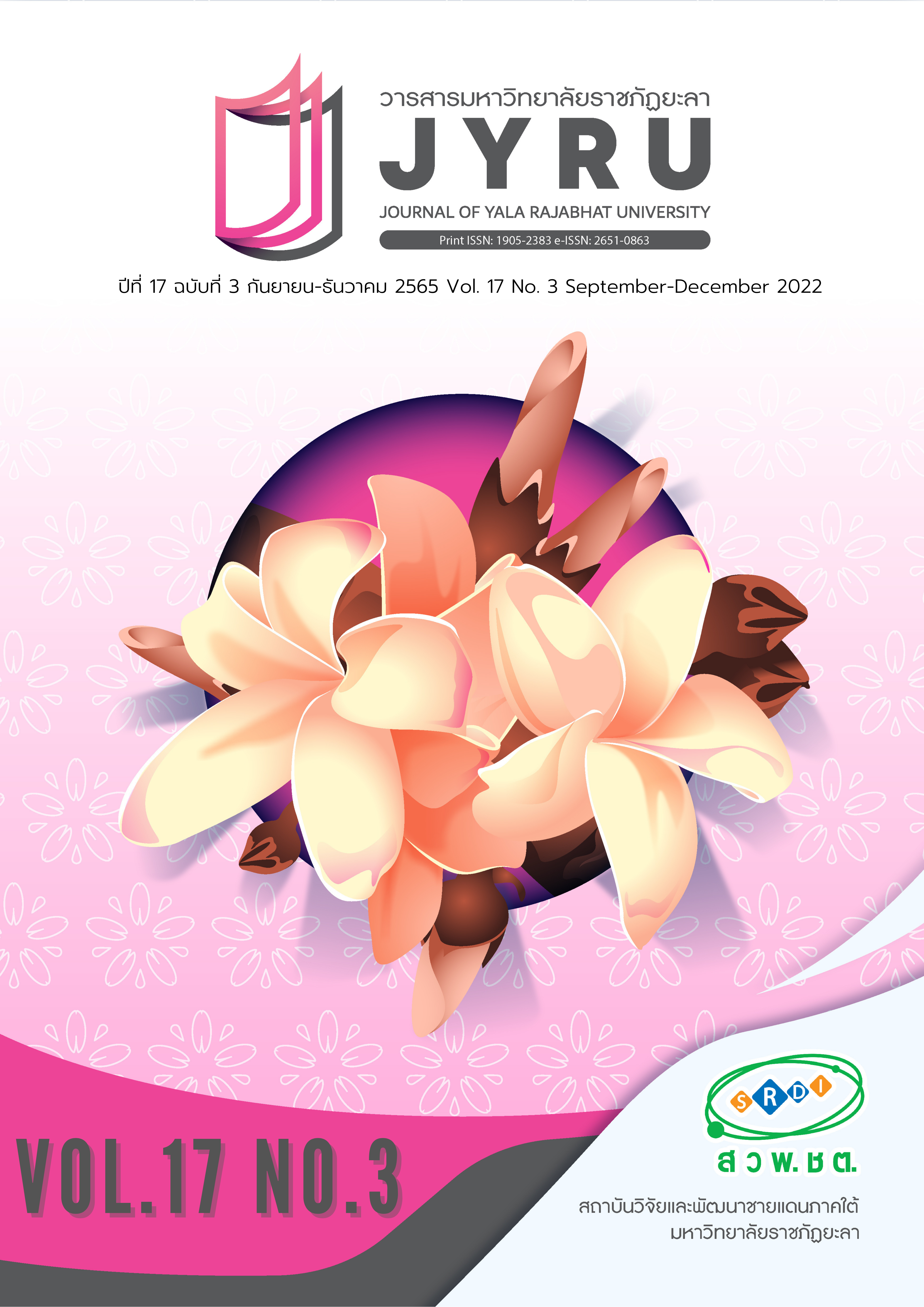ปัจจัยที่ส่งผลต่อความตั้งใจใช้ผลิตภัณฑ์ทางการเงินของสหกรณ์อิสลามในจังหวัดชายแดนใต้ของประเทศไทย
Main Article Content
บทคัดย่อ
งานวิจัยนี้มีวัตถุประสงค์เพื่อศึกษาปัจจัยที่ส่งผลต่อความตั้งใจใช้ผลิตภัณฑ์ทางการเงินของสหกรณ์อิสลามในจังหวัดชายแดนใต้ ตัวแปรการวิจัย ประกอบด้วยตัวแปรแฝง 6 ตัว ได้แก่ ปัจจัยด้านความตระหนัก ปัจจัยด้านต้นทุนและผลประโยชน์ ปัจจัยด้านทัศนคติที่มีต่อพฤติกรรม ปัจจัยด้านการคล้อยตามกลุ่มอ้างอิง การรับรู้ความสามารถในการควบคุมพฤติกรรมและปัจจัยด้านความตั้งใจใช้ โดยการศึกษานี้ยังมุ่งที่จะระบุปัจจัยที่มีอิทธิพลมากที่สุดที่ส่งผลต่อความตั้งใจใช้ผลิตภัณฑ์ทางการเงินของสหกรณ์อิสลาม เก็บข้อมูลจากสมาชิกสหกรณ์อิสลามใน 3 จังหวัดชายแดนภาคใต้ คือ ปัตตานี ยะลา และนราธิวาส จำนวน 400 ตัวอย่าง ด้วยแบบสอบถาม โดยใช้วิธีการเลือกแบบตามสะดวกหรือสมัครใจ วิเคราะห์ข้อมูลโดยใช้สถิติพื้นฐานและการวิเคราะห์โมเดลความสัมพันธ์เชิงสาเหตุ (Causal Relationship Model) ผลการวิจัยพบว่า โมเดลความสัมพันธ์เชิงสาเหตุของปัจจัยที่ส่งผลต่อความตั้งใจใช้ผลิตภัณฑ์ทางการเงินของสหกรณ์อิสลาม มีความสอดคล้องกับข้อมูลเชิงประจักษ์ โดยตัวแปรที่มีอิทธิพลทางตรงเชิงบวกต่อความตั้งใจใช้ผลิตภัณฑ์ทางการเงินของสหกรณ์อิสลาม คือ ทัศนคติที่มีต่อพฤติกรรม การคล้อยตามกลุ่มอ้างอิง และการรับรู้ความสามารถในการควบคุมพฤติกรรม ส่วนตัวแปรที่มีอิทธิพลทางอ้อมเชิงบวกต่อความตั้งใจใช้ผลิตภัณฑ์ทางการเงินของสหกรณ์อิสลามส่งผ่านทัศนคติที่มีต่อพฤติกรรม คือ ความตระหนัก และต้นทุนและผลประโยชน์ โดยปัจจัยด้านการคล้อยตามกลุ่มอ้างอิงมีอิทธิพลสูงสุดต่อความตั้งใจใช้ผลิตภัณฑ์ทางการเงินของสหกรณ์อิสลาม ดังนั้นผลการวิจัยนี้ สหกรณ์อิสลามสามารถนำไปใช้ประโยชน์ในการวางแผนทางการตลาด การกำหนดกลยุทธ์ทางการตลาด รวมถึงการพัฒนาผลิตภัณฑ์ทางการเงินในรูปแบบใหม่ๆ ที่สอดคล้องกับความต้องการของสมาชิกสหกรณ์ เพื่อให้สามารถแข่งขันกับคู่แข่งที่มีอยู่ในตลาดได้
Article Details

อนุญาตภายใต้เงื่อนไข Creative Commons Attribution-NonCommercial-NoDerivatives 4.0 International License.
บทความ ข้อมูล เนื้อหา รูปภาพ ฯลฯ ที่ได้รับการเผยแพร่ในวารสารมหาวิทยาลัยราชภัฏยะลานี้ ถือเป็นลิขสิทธิ์ของวารสารมหาวิทยาลัยราชภัฏยะลา หากบุคคลหรือหน่วยงานใดต้องการนำทั้งหมดหรือส่วนหนึ่งส่วนใดไปเผยแพร่ต่อหรือกระทำการใดๆ จะต้องได้รับอนุญาตเป็นลายลักษณ์อักษรจากวารสารมหาวิทยาลัยราชภัฏยะลาก่อนเท่านั้น
เอกสารอ้างอิง
Ajzen, I. (1991). The theory of planned behavior. Organizational Behavior and Human Decision Processes, 50 (2), 179-211.
Cooperative Auditing Department. (2020). Financial information of cooperatives and farmers' groups. Financial Analysis Group, Cooperative Auditing Department. (in Thai)
Hair, J. F., Black, W. C., Babin, B. J. & Anderson, R. E. (2010). Multivariate data analysis (7th ed.). New Jersey: Pearson Education.
Hair, J. F., Risher, J. J., Sarstedt, M. & Ringle, C. M. (2019). When to use and how to report the results of PLS-SEM. European Business Review, 31(1), 2-24.
Jaffar, M. A. & Musa, R. (2016). Determinants of attitude and intention towards Islamic Financing Adoption among non-users. Procedia Economics and Finance, 37, 227–233.
Kitoa, M. (2019). Relationship between service quality and roles of Islamic cooperatives at Mueang district in Pattani province in its members economic and social development. Master’s Thesis. Thaksin University. (in Thai)
Maulana, H. (2017). Factors influencing behavior to participate in Islamic microfinance. International Journal of Islamic and Middle Eastern Finance and Management, 11(1), 109-130.
Md Zabri, M. Z. & Mohammed, M. O. (2018). Examining the behavioral intention to participate in a cash waqf-financial cooperative-musharakah mutanaqisah home financing model. Managerial Finance, 44(6), 809-829.
Mohamed Fisol, W. N., Abdul Hamid, M. & Cheumar, M. (2018). Determinant factors muslim’s intention to use Islamic cooperative products and services: A case study in Southern Thailand. The 3RD Chrest International Conference 2018, April 4-5, 2018. Kuala Terengganu: UKM.
Narathiwat Provincial Cooperative Office. (2020). Annual report 2020. Narathiwat: Narathiwat Provincial Cooperative Office. (in Thai)
National Bureu of Thailand. (2019). Islamic cooperatives network of Thailand prepare to organize the 15th Islamic cooperative relations day and general meeting in Krabi Province between 1-3 May 2019 [Online]. Retrieved April 24, 2022 from: https://nbtworld.prd.go.th/th/news/detail/TCATG190422152858515. (in Thai)
Pattani Provincial Cooperative Office. (2020). Annual report 2020. Pattani: Pattani Provincial Cooperative Office. (in Thai)
Petchroj, L. & Chamniprasart, A. (2002). Research methodology. Bangkok: Pimdeekarnpim. (in Thai)
Putri, A. R. & Fithria, I. (2019). Factors affecting customer intentions to seek Islamic microfinancing: evidence from Indonesia. Advances in Social Science, Education and Humanities Research, 348, 257-261.
Sarbo, B. (2016). Influence of consumer’s awareness on Islamic banking in Nairobi Country, Kenya. European Journal of Business and Social Sciences, 4(11), 124-129
Sayuti, K. M., Amin H., Abdul Razak, D. & Rizal, H. (2020). Receptiveness of Islamic home financing among Malaysians: A revisit. International Journal of Business and Society, 21(2), 784-802
Shaikh, A. L., Rahim, F. U. & Taimoor, T. (2020). Determinants of attitude and intention towards adoption of Islamic finance among small businessmen of Rawalpindi and Islamabad. Liberal Arts and Social Sciences International Journal (LASSIJ), 4(2), 383-399.
Suksawang, P. (2014). The basics of structural equation modeling. Prince of Narathiwat University Journal, 6(2), 136–145. (in Thai)
The Islamic Cooperative of Pattani Limited. (2021). History of Pattani Islamic cooperative [online]. Retrieved August 22, 2021 from: http://iscop.co.th/thai_iscop/history.php. (in Thai)
The State Railway Workers’Union Saving and Credit Cooperative of Thailand Limited. (2022). History of cooperaives [online]. Retrieved April 24, 2022 from: https://www.srusct.or.th/page.php?pid=4. (in Thai)
Yala Provincial Cooperative Office. (2020). Annual report 2020. Yala: Yala Provincial Cooperative Office. (in Thai)


